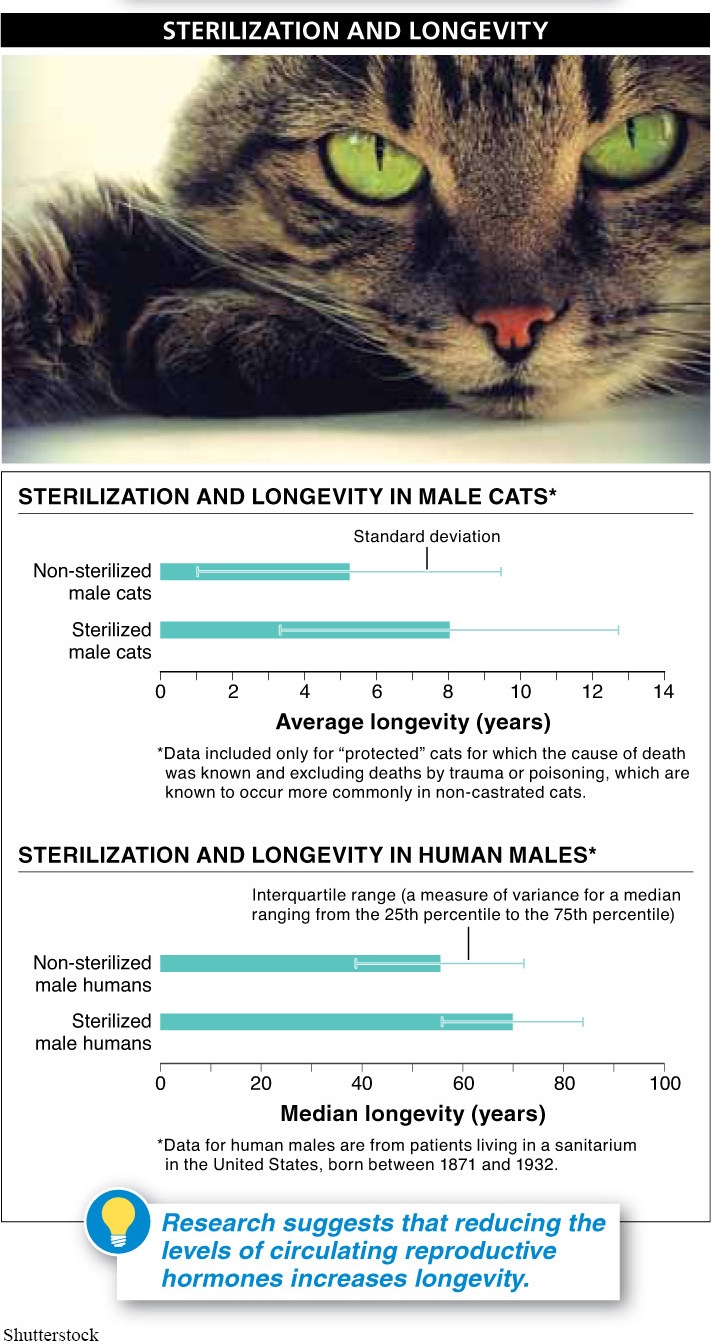

Sometimes the links between cause and effect in biological systems appear straightforward. Take, for example, the results from one of the most appalling “experiments” ever conducted. In the early 1900s, many men committed to sanitariums were castrated. In a case-
Laboratory mice also have significantly lengthened life spans when sterilized. And in similar experiments, female fruit flies exposed to high temperature or X rays experienced a dramatic reduction in ovary size, a severe drop in egg-
Hormones probably have their significant impact on longevity because the rate of cancer occurrence—
991
- Increased lifelong exposure to estrogen is associated with increased rates of cell division and, consequently, increased cancer risk.
- High concentrations of estrogen in the bloodstream are associated with an increased incidence of endometrial cancer.
- Women taking oral contraceptives and women giving birth to higher numbers of children—
both of which reduce a woman’s lifetime exposure to estrogen and other hormones produced by developing follicles— have decreased incidences of ovarian cancer. An analysis of 20 studies reported that five years of taking oral contraceptives reduced women’s lifetime risk of ovarian cancer by approximately 50% (FIGURE 24-25).
There is similar evidence of increased cancer risk linked to circulating levels of progesterone and testosterone.
These seemingly straightforward results, however, lead us to an example that illustrates the extreme complexity and interrelatedness of the body’s physiological systems. It would seem, given the results above, that longevity should be decreased by hormone replacement therapy, which generally involves supplementation of estrogen (or estrogen and progesterone), following menopause—
How can this increased longevity be reconciled with observations on the adverse effects of estrogen? It turns out that estrogen reduces circulating levels of cholesterol, which can reduce the risk of death from heart disease, the top killer of elderly women. Heart disease kills significantly more women than do breast cancer and cancers of the reproductive system, so any treatment that reduces heart disease is likely to increase longevity, even if it increases the risk of breast cancer and reproductive system cancers.
Nonetheless, as a consequence of the complex nature of these results, there is still confusion and concern when it comes to hormone replacement therapy, and the debate continues. In 2013, a review of studies on the mortality risks of hormone replacement therapy concluded that for younger post-
TAKE-HOME MESSAGE 24.10
Hormones affect health and longevity in complex ways. Sterilization of animals, for example, reduces levels of circulating reproductive hormones and increases longevity, usually due to reduced cancer mortality. But in other cases, such as hormone replacement therapy in women under 60, treatment reduces the annual risk of death.
What effect do oral contraceptives have on a woman's exposure to estrogen and also her likelihood of developing ovarian cancer?
Oral contraceptives reduce a woman's exposure to estrogen as well as her likelihood of developing ovarian cancer.
992